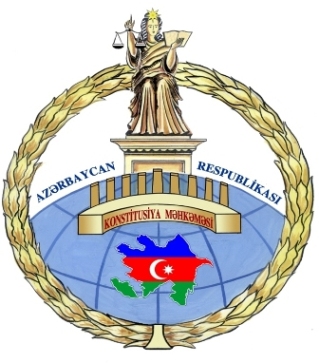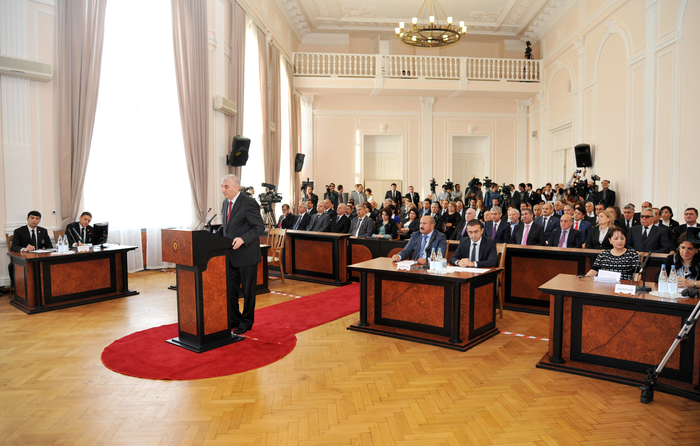CONSTITUTIONAL COURT OF THE REPUBLIC OF AZERBAIJAN
The Constitutional Court of the Azerbaijan Republic is the supreme body of constitutional justice on issues related to its competence by the Constitution of the Azerbaijan Republic. The Constitutional Court is an independent state body and does not depend on the legislative, executive, and other judicial bodies, local self-government bodies, as well as legal and physical persons from organizational, financial, and any other point of view. The main purpose of the Constitutional Court is to ensure the supremacy of the Constitution of the Republic of Azerbaijan, to defend the fundamental rights and freedoms of everyone.
The Constitutional Court was established on July 14, 1998. The Constitution of the Republic of Azerbaijan adopted the legal basis of the activity of the Constitutional Court on November 12, 1995 (amendments were made as a result of the nationwide referendum on August 24, 2002), International treaties to which the Republic of Azerbaijan is a party, the law “on Constitutional Court” of the Republic of Azerbaijan adopted on December 23, 2003, other laws and the internal Charter of the court are constituted.
The Constitution 86, 88, 102, 103, 104, 107, 130, 153, and articles 154 provide for the principles of the formation and functioning of the Constitutional Court. The activity of the Constitutional Court is based on the principles of supremacy, independence, collegiality, and openness of the Constitution of the Republic of Azerbaijan.
According to Article 130.1 of the Constitution of the Republic of Azerbaijan, the Constitutional Court consists of 9 judges. According to this article, judges are appointed by the Parliament (Milli Mejlis) on the basis of the presentation of the President. The Constitutional Court may begin the execution of its powers when 7 judges are appointed. Judges are appointed for a period of 15 years. After the expiration of his term of office, the judge of the Constitutional Court cannot be appointed to the same position again. Chairman and deputy chairman of the court shall be appointed by the president of the Republic of Azerbaijan.
The Constitutional Court checks compliance of laws, decisions, and other normative legal acts with the Constitution and laws of the Republic of Azerbaijan. On the basis of inquiries of the president of the Republic of Azerbaijan, the parliament of the Republic of Azerbaijan, Cabinet of Ministers of the Republic of Azerbaijan, Supreme Court of the Republic of Azerbaijan, prosecutor's office of the Republic of Azerbaijan, and supreme parliament of the Nakhchivan Autonomous Republic and general courts the comments are given to the Constitution and laws of the Azerbaijan Republic.
In accordance with the Constitution, the following subjects may apply to the Constitutional Court: President of the Republic of Azerbaijan; The Parliament of the Republic of Azerbaijan; Cabinet of Ministers of the Republic of Azerbaijan; Supreme Court of the Republic of Azerbaijan; prosecutor's Office of the Republic of Azerbaijan; 
the supreme parliament of the Nakhchivan Autonomous Republic; courts; citizens; Commissioner for Human Rights. In accordance with article 34.1 of the law of the Republic of Azerbaijan" on Constitutional Court," everyone may appeal to the Constitutional Court about normative legal acts of legislative and executive bodies, municipal and judicial acts violating his rights and freedoms for the purpose of restoration of violated rights and freedoms. The Constitutional Court may consider individual complaints filed against judicial acts in the following cases: if the normative legal act to be applied is not applied by the court, then the normative legal act, which is not subject to application, is applied by the court if the normative legal act is not properly interpreted by the court. Such complaints may be filed within six months from the moment of entry into force of the decision of the last court instance and within three months from the moment of violation of the applicant's right to appeal to the court after the full use of his right to appeal against the court Act.
In case of violation of human rights and freedoms by the effective legislative act, normative acts of executive bodies, municipal or court decisions, the Commissioner for human rights may submit a request to the Constitutional Court in accordance with the procedure provided for in the legislation. The Constitutional Court considers cases at meetings of the chambers and plenum. The decisions of the Constitutional Court are final, cannot be canceled, changed, or interpreted officially. The apparatus of the Constitutional Court acts in accordance with the regulation on the apparatus of the Constitutional Court, approved by the chairman of the Constitutional Court.
Department of Constitutional Law, Department of human rights and organizational-analytical; department of criminal and Administrative Law; Department of Civil Law; Department of international law and International Cooperation; Department of reception and complaints of citizens; General Department; Department of systematization of legal support and Legislation; Department of protocol and public relations, sector of control over the execution of court decisions; sector of Organization of court meetings; assistant and counselors of the Chairman and judges operate.
The current management of the apparatus is carried out by the head of the apparatus and his deputy.
In addition, the logistical, financial, and economic provision of the activities of the Constitutional Court is carried out by the Department of affairs of the Constitutional Court.



